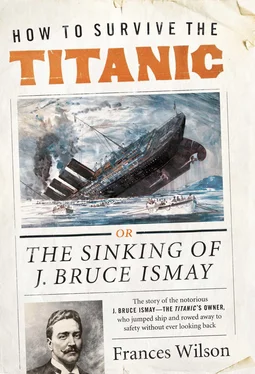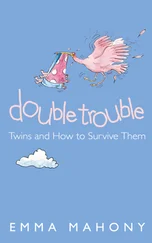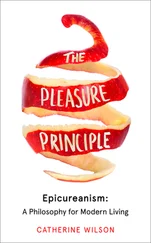‘I saw no women and children waiting when I entered the lifeboat’
The more simple Ismay’s answers, the more complicated the matter seemed to be. It was as though another, octopus-like, story was wrapping its warty tentacles around his own blameless narrative and squeezing out the air. Ismay’s non-answers resemble nothing so much as the trial of the Knave of Hearts in Lewis Carroll’s Alice’s Adventures in Wonderland, where the King confuses what is important with what is unimportant: ‘ unimportant, your Majesty means, of course,’ says the White Rabbit. ‘“unimportant, of course, I meant,” the King hastily said, and went on to himself in an undertone, “important–unimportant–unimportant–important” as if he were trying which word sounded best.’
Ismay had nothing to conceal and everything to conceal, he was both a passenger and not a passenger; he consulted with the Captain about speed and he did not consult with the Captain about speed; the speed was increasing on Sunday and it was not increasing; he was helping to load the boats and he was not helping to load the boats; he saw the Captain but he did not see the Captain; he knew on Sunday that they were near icebergs and he did not know on Sunday that they were near icebergs; he was moving on the deck but he was motionless; there were no passengers left on board when he jumped and there were hundreds of passengers left on board. Important, unimportant, unimportant, important.
Senator Smith had stage-managed proceedings so that Captain Rostron’s testimony followed that of Ismay. While Ismay had told the inquiry what he did not see, did not do, and did not know in relation to his ship, passengers and crew, Rostron described all he did to save the Titanic ’s people; and while Ismay tried to conceal his emotional state from the Senators, Rostron openly wept. In the crisis, Ismay had panicked while Rostron thought clearly; on the stand, Ismay struggled with his meanings while Rostron thrilled the room with a plain account of how he ran his ship under a full head of steam to reach the scene of the wreck. ‘Would you have done so in the night time?’ asked Smith.
‘It was in the night time,’ Rostron politely replied. ‘Although I was running a risk with my own ship and my own passengers, I also had to consider what I was going for.’
‘To save the lives of others?’
‘Yes,’ Rostron nodded. ‘I had to consider the lives of others.’
‘You were prompted,’ said Smith, ‘by your interest in humanity. And you took the chance.’
‘It was hardly a chance,’ said Rostron. ‘Of course it was a chance, but at the same time I knew quite what I was doing.’
‘I think I might say, for my associates,’ Smith looked around him, ‘that your conduct deserves the highest praise.’
It had been ‘absolutely providential’, said Rostron, that the modest Carpathia picked up the mighty Titanic ’s CQD (the maritime distress call). Senator Smith agreed that it had indeed been ‘a very remarkable coincidence’, ‘so providential as to excite wonder’. Had the message come five minutes later, ‘the ill-paid operator’ who ‘snatched this secret from the air, would have forgotten his perplexities in slumber’.
Ismay listened as Rostron (mistakenly) explained that a boat the size of Collapsible C could contain up to seventy-five people — considerably more than the forty-five he had stated earlier — and confirmed that ‘if the Titanic had hit the iceberg bow-on — she should have been in the New York harbour instead of at the bottom of the sea’.
Smith then fired his killer question: ‘Who is the master of a ship at sea?’
‘By law,’ replied Rostron, ‘the Captain of the vessel has absolute control, but suppose we get orders from the owners of the vessel to do a certain thing and we do not carry it out: the only thing then is that we are liable to dismissal.’ Smith took it in: to the crew, the Captain was next to God, to the owner, the Captain was an employee.
Rostron was released, and he returned to begin again his ship’s delayed Mediterranean cruise. He was later given honorary American status when he became the first Englishman to have a plaque of his head placed in New York’s Hall of Fame.
Before the morning session ended, Congressman J. A. Hughes of West Virginia made an intervention. Hughes, whose newly married daughter, Mrs Lucian P. Smith, had been on the Titanic and lost her husband, was a recipient of the mysterious Marconigram from the ‘White Star Line’ stating that the steamer was being towed to Halifax with all her passengers on board. It was Mrs Lucian P. Smith who then told the press, in a story which had spread across America, that on being picked up by the Carpathia, Ismay had insisted he be given a good meal and private quarters. The Congressman now read aloud a message he had received from a certain newspaper: ‘You are quoted in press reports declaring, following Mrs Smith’s story, that Ismay should be lynched. Please wire us, day press rate collect, 500 words, your view of Titanic disaster.’
Hughes wished it known that he denied using that exact wording, and had turned down the suggestion that he provide the paper with any further views. ‘Lynched’ was a loaded term. White supremacists were busy lynching African Americans at this time, and the most recent public lynching had taken place on the night the Titanic sank. It was a term which expressed visceral hatred, and which comprised the wish to see a slow execution before a bloodthirsty mob of spectators. Senator Smith thanked Congressman Hughes, and Ismay left for lunch.
The Titanic is, amongst other things, a story of doubles and so it is appropriate that the Captain of the ship should have the same name as the man who then steered the American inquiry, and that what began as a contrast between two men — the first a villain, the second a hero — should continue as a clash between two cultures, one seen as arrogant and backward-looking, the other as naive and progressive. Ismay, who in England was not considered well bred, symbolised for Americans the moral corruption of the Old World. Senator William Alden Smith, who was regarded in America as an altruist and a seeker after truth, represented to the English the crude self-interest of the New World.
Smith’s background made him the epitome of self-reliance. When he was twelve, his family, who were poor and devout, moved from the sleepy backwater of Dowagiac, Michigan, to the industrial city of Grand Rapids. Soon afterwards his father died of lung disease and William Alden dropped out of school to sell newspapers, deliver telegrams, and run a successful popcorn stall in order to support his mother and siblings. At twenty-one he started studying law (paying his way by cleaning the offices) and at twenty-four he set up his own law firm where he gained a reputation for winning his cases ‘by wearing his adversaries out’. He became a Congressman and then, aged forty-seven, a maverick member of the Senate. A Republican supporter of small businesses and a champion of ‘the little man’, Smith fought against the likes of J. Pierpont Morgan. Nothing would give him greater satisfaction than to watch the House of Morgan sink: if the inquiry were able to prove that Ismay was negligent, or had been cognisant of negligence, on board the Titanic then the IMM could be sued. As a reporter for the Grand Rapids Evening Press explained: ‘The Senator’s viewpoint is that… the question is not one of responsibility merely, but of liability for damages in civil suits. Should it be developed that reasonable diligence was not exercised in sailing the Titanic, the families of survivors have a good chance to collect the damages.’ Smith believed that Ismay was hiding something, and his object was to keep him in the United States until the inquiry was over, even if he was no longer required as a witness. Once Ismay returned to England he would be out of the reach of US law. As long as he remained in Washington, Smith could crack him like an egg.
Читать дальше












